When everything counts, ethanol has the potential to reach net-negative carbon emissions. The 36th annual event theme and programming focused on opportunities to make this future a reality.
For 36 years, the ACE conference has focused on the people of the ethanol industry and their priorities — an event where ethanol producers meet with retailers, policymakers, researchers, and other industry members.
“For nearly four decades, biofuel stakeholders have utilized the ACE conference as an opportunity to not only have candid conversations about the latest technology developments and market updates, but also about where the industry is headed and aspires to be,” said Katie Muckenhirn, ACE Vice President of Public Affairs.
The conference provided two days of content, including updates from ACE leadership, and this year, event coverage featured topics like the ethanol retail marketplace, farm-to-biofuel carbon market opportunities, carbon capture and storage, getting the most out of ethanol coproducts, carbon intensity scoring, hiring practices and labor challenges, driving value to agriculture through low carbon solutions, tax credits in new project investments, and more.
ACE CEO Brian Jennings believes the annual conference was the perfect time to discuss key policy issues, such as year-round E15 availability. “We are grateful EPA issued temporary waivers this summer, identical to action taken last year, to capitalize on E15’s ability to reduce prices,” Jennings said. “Nevertheless, we cannot continue to rely on emergency steps to secure uninterrupted market access for E15.”
Jennings also mentioned ACE is here to help farmers and ethanol producers maximize their investments in the carbon space. “ACE continues working to ensure farmers and ethanol producers are in a position to obtain valuable clean fuel credits for the many steps they are taking to improve ethanol’s carbon score,” Jennings said.
Read on for a recap of the event!
GENERAL SESSION PANELS & SPEAKERS – Day One
Everything Counts: Updates from ACE Leadership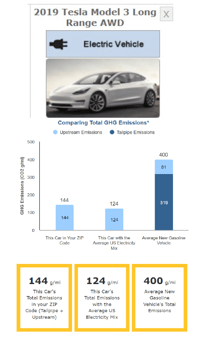 ACE board president Dave Sovereign, ACE CEO Brian Jennings, and ACE CMO Ron Lamberty updated attendees on ACE’s current work and upcoming goals within the industry. The focus was on securing year-round E15, the Renewable Fuel Standard (RFS), monetizing climate-smart agriculture through ethanol, the importance of advocacy, and market development. “We must remain a vigilant watchdog over EPA implementation of the RFS,” Jennings said in his remarks. “But we must do much more, beyond the RFS, to increase ethanol demand well into the future.”
ACE board president Dave Sovereign, ACE CEO Brian Jennings, and ACE CMO Ron Lamberty updated attendees on ACE’s current work and upcoming goals within the industry. The focus was on securing year-round E15, the Renewable Fuel Standard (RFS), monetizing climate-smart agriculture through ethanol, the importance of advocacy, and market development. “We must remain a vigilant watchdog over EPA implementation of the RFS,” Jennings said in his remarks. “But we must do much more, beyond the RFS, to increase ethanol demand well into the future.”
Keynote: Ethanol Outlook in a Changing Energy Market Landscape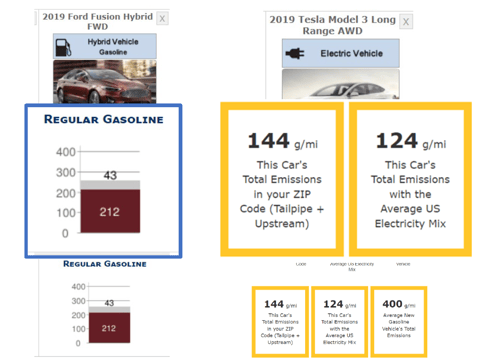
EVOLVING ENERGY MARKETS: Tom Kloza, Global Head of Energy Analysis with OPIS, provided useful insight into the current landscape of the liquid fuel market, and what to expect in the months ahead at The ACE conference.
Untangling and Maximizing IRA Biofuel Incentives
IRA DISCUSSION: Just over a year since the Inflation Reduction Act (IRA) was signed into law, The ACE featured a panel of tax experts, including Bradley Pederson with Christianson PLLP, Mel Schwarz with Eide Bailly LLP and Donna Funk with Pinion, to cover enhancements to Sections 45, 45Q, 45V, 48 and the new Section 45Z of the Internal Revenue Code, and share insights on how to maximize on these incentives for biofuel producers.

Cultivating Progress: Climate-Smart Farming for Carbon Markets
ON-THE-GROUND DEVELOPMENT: Attendees heard about a first-of-its-kind project in South Dakota to illuminate the path forward to increase ethanol value and demand based on climate-smart farming practices. Project partners Jonathon Lehman with Cultivating Conservation, Brennan Lewis with South Dakota State University, and Ron Alverson, a board member of Dakota Ethanol, shared an update on the progress being made with participating farmers under ACE’s Regional Conservation Partnership Program (RCPP) project funded by USDA.
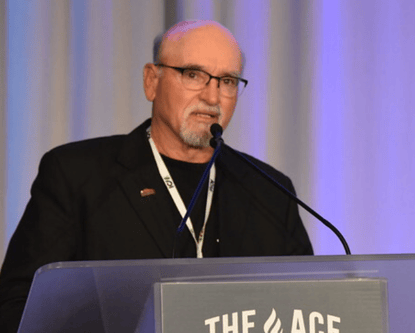

GENERAL SESSION PANELS & SPEAKERS – Day Two
E15 & Flex Fuel Roadmap: Small Retailers Clearing Roadblocks and Blazing Trails for Ethanol Availability
EARLY ADOPTERS: Nearly every big chain was prodded into action by brave individuals with smaller operations who added higher blends early on. An ACE conference panel featured two early high blend adopters — Glenn Badenhop with American Freedom Energy and Bruce Vollan with Vollan Oil Co. — to share what they’ve learned over years of marketing E15 & flex fuels, some of the battles they’ve had to fight, and how ethanol has impacted their businesses.
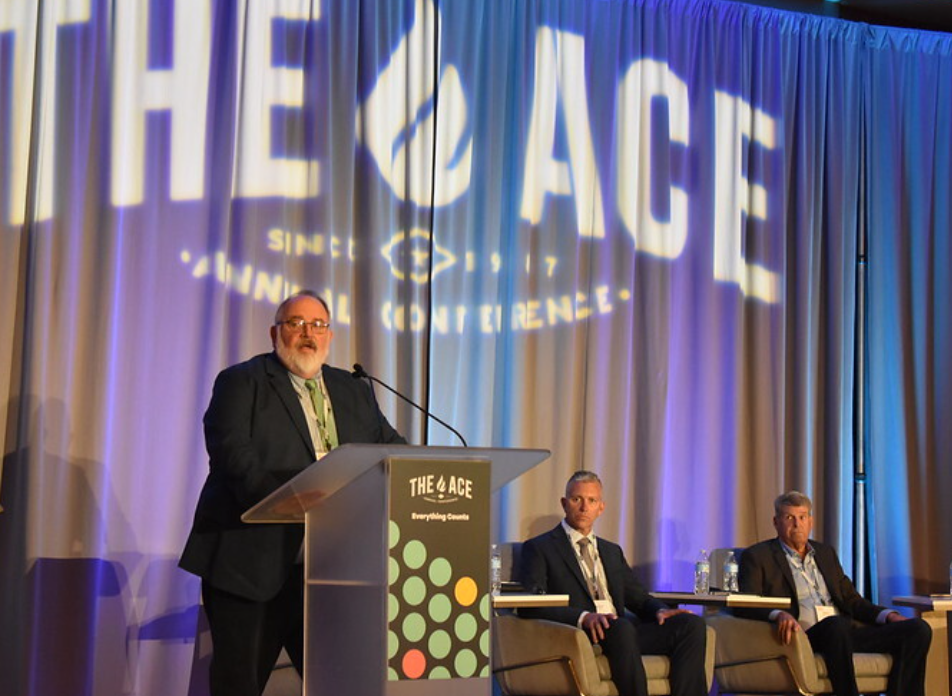
The Journey to Capture, Store, and Utilize Carbon
CCUS: Game-changing enhancements to the 45Q tax credit for carbon capture, utilization,  and storage have jump-started many innovative projects and opportunities. Speakers Britta Bergland with Merjent Inc., Aaron Eldridge with Summit Carbon Solutions, and Ashkan Shoja-Nia with StormFisher Hydrogen covered everything from permitting, construction, and operation of pipeline projects to CO2 utilization opportunities for ethanol producers.
and storage have jump-started many innovative projects and opportunities. Speakers Britta Bergland with Merjent Inc., Aaron Eldridge with Summit Carbon Solutions, and Ashkan Shoja-Nia with StormFisher Hydrogen covered everything from permitting, construction, and operation of pipeline projects to CO2 utilization opportunities for ethanol producers.
Outlook for Exports
GLOBAL OUTLOOK:.U.S. Grains Council’s Mackenzie Boubin spoke on opportunities and challenges to increase ethanol and coproduct markets globally and how they’ve shifted over the past few years, including activity in Canada, Vietnam, South Korea, Japan, Taiwan, the United Kingdom, the EU, India and more.
_____________________________________________________
AWARDS
Merle Anderson Award Recipient: Ron Alverson, founder and current board member of Lake Area Corn Processors LLC (Dakota Ethanol) in Wentworth, SD; ACE board member and treasurer.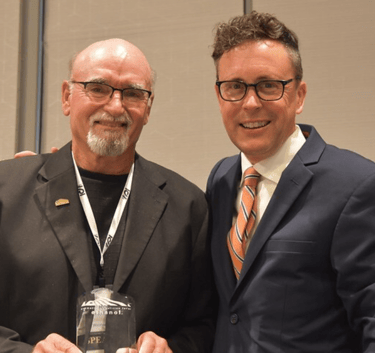
Alverson has played an influential role in advocating the importance of carbon intensity to corn farmers and ethanol producers; from how tillage practices help increase soil organic carbon, and how 4R nutrient management reduces nitrous oxide emissions, to helping the Department of Energy scientists at the Argonne National Laboratory, who invented the GREET model, better understand modern day farming practices.
“Thank you for this incredible honor,” Alverson said. “It is an honor to serve on this board of directors with all of you, and I really look forward to continuing to work with everybody here – let’s move this industry forward.”
Grassroots Award Recipient: Jan Lundebrek, board member of the Chippewa Valley Ethanol Company (CVEC) in Benson, MN, and current ACE board member. 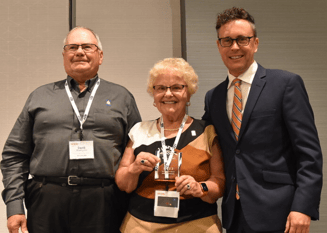
Lundebrek’s enthusiastic leadership was instrumental in the formation of Chippewa Valley Agrafuels Cooperative (CVAC) and CVEC, one of the first ethanol plants in the state of Minnesota. Her extensive financial background helped ensure shares were sold to local farmers and loans were secured to build the plant.
“I just want to thank everyone for stepping up when it counts,” Lundebrek said. “It’s not just me – it’s the work of the rural communities, ACE and the individuals that really make a difference.”
Paul Dana Marketing Vision Award Recipient: Glenn Badenhop, owner of American Freedom Energy in Liberty Center, Ohio. 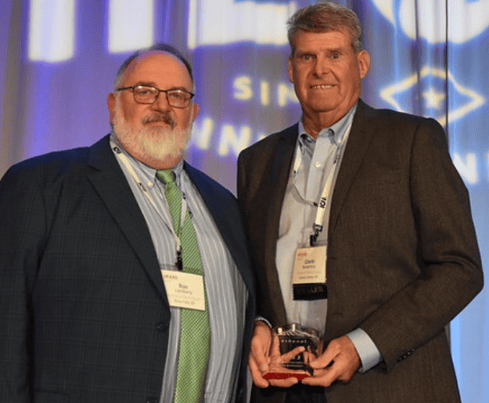
Badenhop received this award for his leadership in promoting the expansion of higher blends of ethanol to consumers, as well as overcoming many trials as a station owner. Badenhop spent the last 18 months battling his oil company supplier and clearing their red tape to sell E15, alongside the other gasoline grades under the canopy, which he couldn’t do when he initially began offering the product.
“It’s been a long road making the vision I had twelve years ago become a reality, but I kept working at it and this award makes it worthwhile,” Badenhop said. “There is nobody else in my area offering higher blends, so I feel like I have a leg-up on the competition, and this award proves higher blends do work and are accepted by the consumer.”
Policy and Legislative Leadership Award Recipient: U.S. Representative Angie Craig (MN-2)
Representative Craig received the award for her strong leadership on biofuel issues, from her ongoing commitment to ensuring consumer access to E15 through the Consumer and Fuel Retailer Choice Act (H.R. 1608) to backing of the Next Generation Fuels Act (H.R. 2434), which would remove barriers to expanding the use of ethanol as well. Representative Craig has also been a staunch advocate for farmers, keeping the Renewable Fuel Standard (RFS) on track and recognizing the role ethanol plays in uplifting rural communities and decarbonizing our transportation sector.
For more details about this year’s event, visit ethanol.org/events/conference. Look back on social media by searching the event hashtags #EverythingCounts and #ACECONF23.
Testimonials
“The ACE conference gave me an opportunity to take a deeper dive into the IRA impacts of ethanol and what to be thinking about in the future.” – Matthew Rohlik, 2023 ACE Conference Attendee
“As a professional who works adjacent to the ethanol industry, I was welcomed by every person I encountered. The sessions were valuable, information-dense, and dare I say entertaining at times. I plan to attend again.” – Trisha Jackson, 2023 ACE Conference Attendee
_____________________________________________________
ACE 2023 Board of Directors Elections
ACE announced the re-election of several board members and the election of two new members to the organization’s board of directors during its annual business meeting prior to ACE’s 36th annual conference in Minneapolis, Minnesota. A complete roster of the ACE board of directors is available at https://ethanol.org/meet-ace/board.
Re-elected to the board of directors for three-year terms:
- Badger State Ethanol – Represented by David Kolsrud
- ICM, Inc – Represented by Trevor Hinz
- Mid Missouri Energy– Represented by Chris Wilson
- Nebraska Ethanol Board – Represented by Reid Wagner
Harmon Wilts, representing Chippewa Valley Ethanol, was elected to take the seat previously held by Jan Lundebrek. “I have watched from a distance the great work ACE has been doing,” Wilts said. “I am very excited to help take ACE to new levels and drive the biofuels industry now and in the future.”
Dave Ellens, representing South Dakota Corn Growers Association, was elected as a new member to the board of directors for a three-year term. “I’m looking forward to this new position on the ACE Board,” Ellens said. “Ethanol has and will continue to play a large role on my farm and in my community.”




